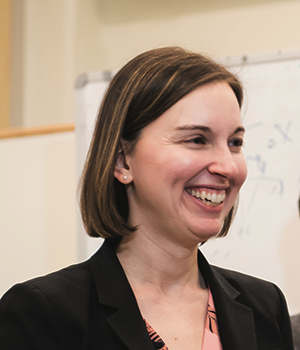
Julie Shah
(she/her)
Aeronautics and Astronautics
Communicating and collaborating
Professor Julie Shah is a stabilizing force for her graduate students starting from the first day of their program and continuing well after graduation. “Somehow, after one of the most trying weeks in my graduate career,” one student recalls, “I came out of a conversation with Julie with a new excitement about research and about grad school.” Shah’s rejuvenating spirit is contagious and graduate students cherish her positivity and support.
Shah is Associate Professor in the Department of Aeronautics and Astronautics at MIT where she directs the Interactive Robotics Group of the Computer Science and Artificial Intelligence Laboratory. Shah received her SB (2004) and SM (2006) from the Department of Aeronautics and Astronautics at MIT, and her PhD (2010) in Autonomous Systems from MIT. Her group draws on expertise in artificial intelligence, human factors, and systems engineering to develop interactive robots that emulate the qualities of effective human team members to improve the efficiency of human-robot teamwork.
Productive balance
Shah believes that we do our best work when we are happy and well rested so she strongly encourages her students to work reasonable hours. “She recommends that we take evenings and weekends to take a mental break so we are able to again work productively the next day,” one student says. This is an example of encouraging work/life balance, a Mentoring Guidepost identified by the C2C program.
Having been a graduate student at MIT, Shah knows the importance of finding an equilibrium and the impact of leading by example. She says, “I try to show my students the ways that I live a well-balanced life, prioritizing time with my husband and kids, and with extracurricular activities as a head of house in Sidney Pacific graduate dorm.”
As a result of the many hours Julie spends with her students, they learn from her and even mirror her behavior, according to one lab member. “Shah’s mission extends beyond advising, research, or even producing good scientists and engineers; she is intent on shaping us as people.”
Tailored training
Dedicating time to meet with her students each week is a priority for Shah. “The time I spend advising is some of the most important time I spend,” Shah says. “It allows my students and [me] to connect on the things that matter most, so that together we can recharge to tackle challenges.”
Shah commits to her students’ professional development beyond the lab. “She encourages all of her students to try out an internship, try TAing a class, or try mentoring UROPs before graduating,” one student remarks “so that we have a better idea of what kind of career we might enjoy.”
Although having weekly meetings with Shah seemed daunting at first, one student remarks that having that time set aside is extremely beneficial for her workflow. “The time can be spent however I want, whether it’s for debugging code, brainstorming ideas, sharing a nugget of new information, talking through a life stressor, or just running her through my progress so far.” Shah encourages and facilitates collaboration, and regular, open communication is an important first step.
Robotics is a team sport, Shah reminds her students. “It takes many hands to make a robot do something,” she says, “and by helping each other we all accomplish more.” Thanks to Shah’s leadership, her students enthusiastically pitch in to make each other successful.
One student nominator recalls the words Shah said in their very first advisor/advisee meeting: “Now that you’re in my lab, I am forever your advocate. I will always be on your team, and you never have to prove yourself to me.” This sentiment proved to be true, the student says, “Julie keeps her word.”
